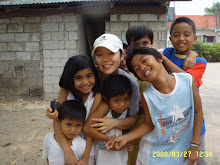7. Using the five senses, describe through the eyes of Sawi Child. How would they perceive the arrival of the Tuans?
The odor of the sago filled the hut as the sun disappeared beyond the horizon. I flung the sago angrily at Rayen, my father’s fifth wife and the youngest, declaring that I wasn’t hungry. “What a waste”, I thought, “I could spend this time training to become a warrior”. With that, I grabbed my bow and arrows and strode out of the hut to practice shooting.
About twenty steps away from the tree, I stopped and in one swift motion, fitted the arrow on to the bow. Feeling the misty, cool air settling on my skin, I focused only on the tree and erased my surroundings. Taking a deep breath, I released. The arrow seemed to split through the air as it whizzed forward and struck the tree – dead center. Whooping with glee, I fitted another arrow and took a step back to try again. As my eyes narrowed onto the tree, I sensed something moving beyond the tree on the river. It was a canoe. Squinting, I saw that there were Tunas heading this way.
“They’re here!” I shouted as loud as I could towards the inner part our tribe. My fateful message seemed to travel through the air, rushing into every hut and bringing out every single inhabitant outside. I saw my friends darting out just like everyone else with dirt flying behind them. Approaching closer to the riverbank with the rest of the people, I saw the canoe with the Tuans clearly growing bigger as it glided slowly towards us. The canoe finally reached the shore and came to a gentle halt. My heart hammered like war drums as the Tuans stepped out of the canoe. It was the first time I had seen them this close; I had caught a glimpse of the Tuan man who had come for the past few days to build his hut here. I could see that their skin was all white unlike the rest of us and they were wearing pieces of… something that I had never seen before.
As night grew on, the Tuans began to make their way to their new hut as we surrounded them and followed them. Together with a few of the tribesmen, my father brought out drums to celebrate their arrival. As the Tuans disappeared inside their hut, the drums grew louder and my heart thumped more widely as all of us savored this moment of pride that the Tuans had chosen our tribe to live with.
Suddenly, light exploded from the hut as if it was ablaze. The light hit our eyes and pandemonium broke out. Everyone tried to run towards the opposite direction, away from the dazzling hut. Shielding my eyes from the blinding light, I roughly pushed through the mayhem, shoving those who were doing the same but were blocking my way. Then, the Tuan man came out and shouted, pouring instant silence over the havoc. He tried to reassure us, which brought back the people who had succeeded in putting a distance between them and the hut. His voice had strength, like a warrior, but it was not harsh forceful. His eyes seem to hold power and authority like our chief did. I sank into my thoughts about the Tuan, recalling the eavesdropping of the chief and several tribesmen, including my dad, had been saying about the Tuans living with us and wondered what could possibly bring these Tuans to our tribe.

http://www.ramblingroses.net/Sluice.JPG
http://www.frightcatalog.com/i/360x360/1012024.jpg











